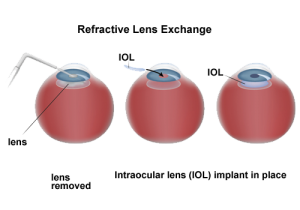How is Refractive Lens Exchange Different from Other Procedures?
January 23, 2024
Is your eyesight impacting your quality of life? If you have difficulty seeing clearly, you may use contacts or glasses to counteract refractive errors.
However, some people have worse eyesight than others, so you may find it challenging to function without visual aids. Also, even if your prescription is less strong, you may still get tired of wearing your glasses or contacts daily.
There's upkeep required when using visual aids, which can get frustrating. That's where a permanent solution for refractive errors can sound appealing.
Although LASIK is the most well-known laser vision correction procedure, it's not the only one. Another procedure worth considering is refractive lens exchange (RLE).
Refractive lens exchange can be a life-changing treatment for many patients. Keep reading to learn more about refractive lens exchange and how it's different from other procedures if you're considering correcting your vision!
What is Refractive Lens Exchange?
 Refractive lens exchange is a minimally invasive vision correction procedure. During this procedure, your Whitten Laser Eye surgeon will remove the natural lens in your eye and replace it with an artificial lens called an intraocular lens (IOL).
Refractive lens exchange is a minimally invasive vision correction procedure. During this procedure, your Whitten Laser Eye surgeon will remove the natural lens in your eye and replace it with an artificial lens called an intraocular lens (IOL).
Before having refractive lens exchange, you and your ophthalmologist will work together to choose the best intraocular lens. Choosing an IOL will involve considering your lifestyle, visual goals, and desires for your vision after the procedure.
Do you lead a more active lifestyle and want to reduce your dependence on glasses and contact lenses? Do you want to be able to see clearly at all distances, or are you more concerned with not needing reading glasses?
Knowing this information will make it much easier to determine the best IOL. There are many IOLs to choose from, depending on what will fit your life and needs best.
Refractive lens exchange is almost identical to cataract surgery because it removes and replaces your natural lens with an artificial lens. However, you don't need to have cataracts to have refractive lens exchange.
In fact, by having refractive lens exchange, you can prevent cataracts from forming later.
Ready for Refractive Lens Exchange?
Find out if you’re a candidate.
What Happens During Refractive Lens Exchange?
When you visit Whitten Laser Eye for refractive lens exchange, our friendly staff will walk you through the procedure and answer any questions.
But, if you're wondering how the treatment process works, you can review the basic steps below:
1. Your surgeon applies numbing eye drops and may give you medication to help you relax.
2. They then use a specialized laser or a blade to make a small incision.
3. Then, they use a small tool to remove the natural lens in your eye.
4. Next, they will place the intraocular lens through the small incision. You won't need stitches as the incision is so tiny it heals independently.
5. Finally, a shield is placed on your eye to protect it as it heals.
The procedure only takes about 30 minutes. You will need someone to drive you home afterward, but your vision should stabilize within a few days.
After having the IOL put in your eye, it will immediately take over and help you see clearly. The lens is responsible for refracting light from the eye and returning it to the retina.
How Does Refractive Lens Exchange Compare To Other Procedures?
Refractive lens exchange is often suggested as an alternative to LASIK or other laser eye procedures. LASIK reshapes the cornea to correct refractive errors like nearsightedness, farsightedness, and astigmatism.
While LASIK is often successful and works well for many patients, it's not always an option for patients with refractive errors or other underlying eye conditions.
The two procedures also work quite differently. With refractive lens exchange, you'll have your natural lens removed and replaced with an intraocular lens.
With LASIK, the cornea shape is changed using a specialized laser. While they are different, both procedures can yield long-lasting results.
Refractive lens exchange is the only vision correction procedure that can treat presbyopia. It's also often recommended for patients whose prescription is outside the treatment limits of what LASIK can treat.
How Do I Know If Refractive Lens Exchange Is Right For Me?
The only way to know if you're a good candidate for refractive lens exchange is to request a consultation at Whitten Laser Eye. Dr. Whitten will assess your eyes, medical history, and vision to determine if refractive lens exchange is a safe and sound option for you.
However, you may be a good candidate for refractive lens exchange if:

- You're severely nearsighted or farsighted and aren't a good candidate for LASIK
- You have age-related farsightedness or presbyopia and don't want to wear glasses or contacts
- You have a stable prescription that's remained unchanged for a year or more
You may not be a good candidate for refractive lens exchange if these factors apply to you:
- You have age-related macular degeneration
- You have diabetic retinopathy
- You have unrealistic expectations about what refractive lens exchange can achieve
Dr. Whitten will discuss these and other considerations during your consultation with you. If you have questions or concerns, don't hesitate to ask.
How Successful Is Refractive Lens Exchange?
If you're a good candidate for refractive lens exchange, you can rest easy knowing it's a highly successful treatment. Because the IOL works just like your natural lens, but without the frustrations of refractive errors, it ensures you can see much more clearly. However, this will depend on the IOL you choose.
Most patients don't need to wear their contacts or glasses after the procedure. Those patients who still need visual aids are often able to reduce their dependence on them and only need them for certain tasks.
Request A Consultation To Learn More
Refractive lens exchange could be the solution to improve your vision without worrying about cataracts in the future.
Are you curious about the procedure and whether you're a good candidate? Start by requesting an appointment to discuss refractive lens exchange at Whitten Laser Eye in Maryland, located in Charlotte Hall and Chevy Chase!



